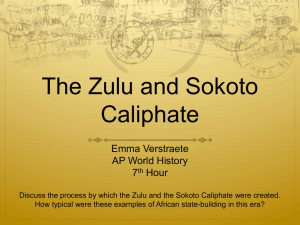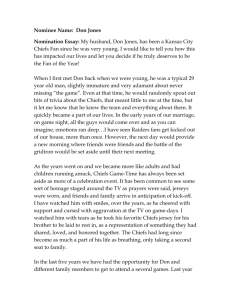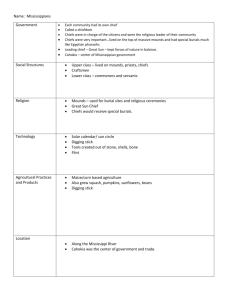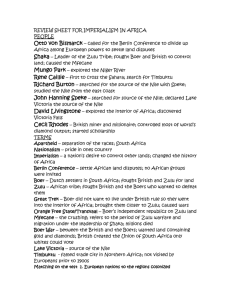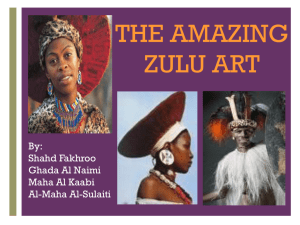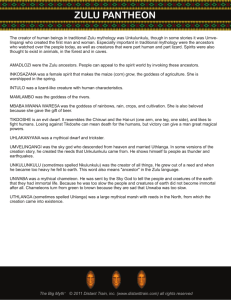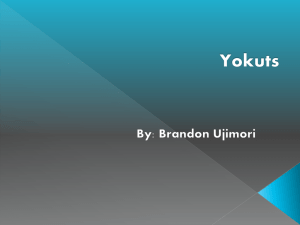Lecture 10 slides
advertisement
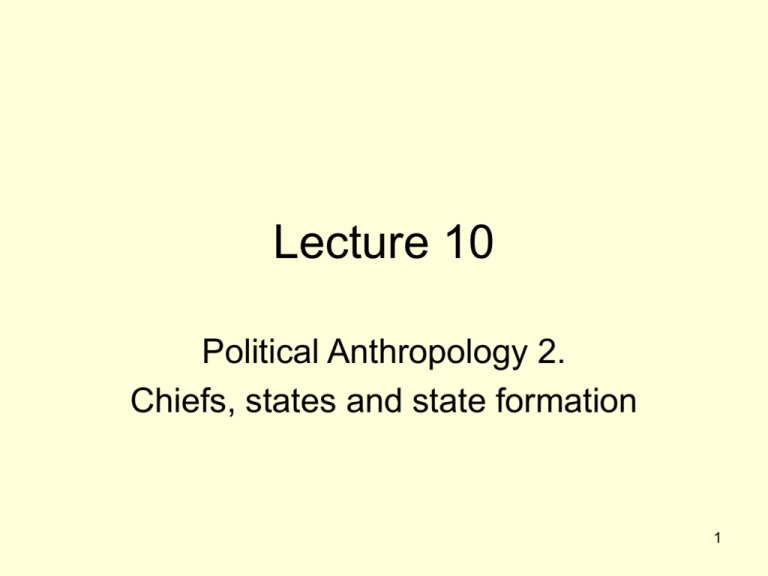
Lecture 10 Political Anthropology 2. Chiefs, states and state formation 1 Questions • Why should anyone accept being a subordinate • What is authority and why do we obey? Or not? • What is the nature of power? 2 Some theories • Political order is achieved through coercion and the origin of social inequality is power • Political order is a functional necessity, it enables the efficient avoidance of conflict and thus for society to progress. 3 Typologies of political leadership • Lewellen, Ted C. Political anthropology : an introduction. South Hadley, Mass. : Bergin & Garvey, 1983 • Johnson, Allen W. & Timothy Earle. The evolution of human societies : from foraging group to agrarian state. Stanford, Calif. : Stanford University Press, 1987. 4 Ethnographies • Sahlins, M. 1963 Poor Man, Rich Man, Big-Man, Chief: Political Types in Melanesia and Polynesia " Comparative Studies in Society and History Vol. 5, No. 3 (Apr., 1963), pp. 285-303 • Gluckman, Max 1940 “The Kingdom of the Zulu” in Fortes, M. and E. E. Evans-Pritchard (eds) African Political Systems London : Oxford University Press. • Deflem, Mathieu. 1999. “Warfare, Political Leadership, and State Formation: The Case of the Zulu Kingdom, 1808-1879.” Ethnology 38(4):371-391. http://www.cas.sc.edu/socy/faculty/deflem/zzulu.htm 5 Marshal Sahlins: “Poor man, Rich man, big, chief” • Comparison of political leadership between Melanesia and Polynesia • Both regions have similar production base, family production of: – Yams, taro, breadfruit, bananas and coconuts, and raising of pigs. • Yet Polynesia has elaborate forms of rank and chiefdoms • whereas Melanesia has small scale polities with leadership based on personal renown. 6 Melanesia • In Melanesia power tends to be personal based on reputation and achievement "Big man" officiating at a pig give-away ceremony in Papua New Guinea http://anthro.palomar.edu/political/pol _2.htm 7 Melanesia • “Bigman” is not a title of chief or office, variously translates man of renown, generous richman, or centre man. • Such a man in the centre of a faction • He is able to manipulate power by reciprocity and exchange with other groups and factions • These men assert their authority by amassing large numbers of pigs and other valued goods and giving them away to rivals • ‘Big men’ have a entrepreneurial career • The political limits of the system are set by the fact that leadership is personal, so that reputation and faction fade with a leader’s prowess and die with him. 8 Polynesia • Polynesia has pyramid structure of chiefs and sub-chiefs. Samoan chief. , c 1910 www.oceaniaethnographica.com/poly9.html 9 Polynesia • • • • • • • Kinship provides as system for ranking all in society. Chiefs inherit office as eldest sons Chiefs are able to command people and resources Tabu Redistribution Chiefs retinue/faction supported by work of lower ranks Unstable centralisation: The political limits of the developing chiefdom set by extraction possible from the core of the polity to keep control of the periphery. 10 King Mata'afa Iosefa (1832-1912), his wife Talala (Kalala) and his daughters in traditional costumes. Samoa ca. 1900. Malietoa Tanumafili II, the king of Western Samoa, died 2007 • 11 Key points of comparison • Chiefly personality v. “Bigman” personality • Impersonal office allows redistribution rather than reciprocity • Family based division of labour set limits on amount which can be extracted to support other specialists • Significance of ideology; reciprocity with the gods enables their representatives to accumulate • “The combination of economic control, military might, and ceremonial legitimacy,” are the key themes in the evolution of chiefdoms. T.Earle 12 Institutional characteristics of a state • • • • • Territory - borders Monopoly of the use of violence - army Taxation – revenue raising Administration – bureaucracy, judiciary Claim to legitimacy – expressed in ritual and ceremony 13 “The Kingdom of the Zulu” by Max Gluckman in African Political Systems. • They were pastoralists • The Nguni family of Bantu practising shifting cultivation. speaking people who later They lived in scattered formed the Zulu nation migrated homesteads occupied by male into south eastern Africa about agnates and their families; a the middle of the 15C. number of these homesteads were united under a chief the heir of the their senior line into a tribe. A tribe was divided into sections under brothers of the chief and as a result of a quarrel a section might migrate an establish itself as an independent clan and tribe. Cattle raids were frequent but there were no wars of conquest. http://www.sahistory.org.za/pages/hands-onclassroom/classroom/pages/projects/grade10/lesson2/05-effects.htm 14 mfecane • From about 1775 the motive for war had changed, possibly owing to pressure of population. Certain tribes conquered their neighbours and small kingdoms emerged. In this struggle Shaka head of the Zulu tribe was victorious; by his personal characteristics and military strategy, he made himself in ten years ruler of what is now Zululand. He organised a nation out of the people he conquered. http://www.sahistory.org.za/pages/people/images/zulu_shaka.jpg 15 Shaka • Shaka follows a pattern of founding national heros, starting as a excluded marginal figure who through charisma and organisational innovation unites the nation. Military tactics of shield and stabbing spear. Extreme cruelty and paranoia • In the series of devastating wars which led to great loss of life and widespread migration. The clans dispersed as units and members of a single clan might be widely spread over Zululand. They retained their clan names and their respect for the head of the senior line. The important kinship links which were the basis of social organisation were still formed by the inhabitants of separate homesteads. At the head of a homestead was the senior male by descent of the group. • Among the local agnatic groups there were often homesteads of other relatives by marriage or matrilineal relationships; • Strangers might attach themselves to an important man as his servants or dependents and would be absorbed with their relatives into his kinship group as quasi kin. 16 The regiments • An important change in Zulu life was caused by the younger men having to serve at the kings military barracks which kept them from home most of the year. In the homesteads the older men and the boys herded the cattle and the women worked the fields. Each homestead had its own fields and cattle fold. But the division of labour had to vary to accommodate military service to the king. The King’s regiments could not marry until permitted to by the king, and married a regiment of women. • The regiments were recruit by age. Completed in honour and valour and were rewarded with distinctive uniforms and shields. 17 Zulu warrior regalia http://www.smithsonianglobalsound. org/trackdetail.aspx?itemid=21137 18 Nationhood • The Zulu nation thus consisted of members of some hundreds of clans united by the allegiance to the king. The people belonged to the king and he therefore took the fine in cases of assault or murder. • While the kinship basis of politic groups disappeared the new ones which emerged were described in kinship terms for political officer was spoken of as the father of his people and his relationship to them was conceived to be similar to that of a father and his children. But importantly political organisation and allegiance had become territorial. • The king owned the land. All who came to live in Zululand had to acknowledge his sovereignty. This was true of the chiefs at the lower levels of the political pyramid. Anyone coming onto land belonging to apolitical authority became subject to that authority and all his subjects were entitled to land in his area. 19 Nation and state • The Zulu nation therefore can be defined as a group of people owing allegiance to a common head, the king, and occupying a defined territory. • They combined under the king to attack or defend themselves against outside groups. • In addition to controlling relations with other Bantu peoples and the Europeans, the king exercised judicial, administrative and legislative authority over his people with power to enforce his decisions. • He performed religious ceremonies and magical acts on behalf of the nation. • All the tribes which made up the nation spoke dialects of the same language and had a common culture. 20 Military power and control of violence • The dominant values of Zulu society was that of the warrior. The rituals of state were militarised and performed by regiments of warriors and maidens. The regiments belonged to the king alone. They lived in barracks concentrated about the capital, the chiefs had no control over the regiments and assembled their own people in territorial not age divisions. • The centralisation of regiments in the kings area gave him a position in Zululand entirely different from that of any of his chiefs, and gave the state a stability and power not previously available. 21 Courts and administration • The king was also the supreme court of the nation and appeals from the chiefs courts went to him. There were always in residence at his capital some indunas who heard special difficult cases and gave verdicts in the king’s name. • Most of the indunas were chiefs ruling areas of their own, others were sons, brothers and uncles of the king and there were commoners “lifted up” by the king for their wisdom and knowledge of the law. • Two of the kings Indunas were more important that the others; the one was specifically commander of the army and was a chief or prince; the other was the great induna (prime minister) and had the weightiest voice in discussing affairs of state. He was never a member of the royal family. • The Zulu believe that the welfare of the country depended on the king having wise and strong councillors ready to criticise the king. In Council the king was supposed to put matters to the Council but speak last having heard his councillors views. Thus the indunas placed a degree of constraint on the King. 22 Administration • • • The kings communicates with is chiefs by runners. To impersonate a kings messenger was punishable by death. Thus orders to mobilize at the capital, projected laws and matters of national import were announced to the people by the king through his chiefs, though many announcements were made at the first fruits ceremony. When necessary the chiefs passed on these orders to their indunas in charge of wards and these reported to the heads of lineage groups and homesteads. All the people were entitled to express their opinion on affairs and they did this through the heads of their kinship groups and then their intermediate political officers. In addition the chiefs and indunas had administrative duties within their own districts including the allocation of land and maintenance of order, trying of cases, watching over their districts welfare, taking ritual steps to protect the crops, and looking for sorcerers. Chief like the king received gifts of corn and cattle but they levied no regular tribute. They could call out their subjects to work their fields, build their homesteads, arrest malefactors or hunt. The nation was a federation of tribes who separate identities were symbolised by their chiefs. The tribes were even autonomous within the national organisation for on occasion many tribesmen supported their chiefs in quarrels with the king. However, it was interrelations between tribes that the tribal identities mainly appeared. 23 Gifts, tribute, taxation? • From his subjects point of view, the main duty they owned was military service including labour service. • it was customary to vie him gifts of grain beer cattle and (some say) girls. • As he also received most of the cattle, the women captured in war, fines for certain offences, he was easily the richest man in the nation. • In return for this he was expected to feed and help his people generously. He had to care for his regiments and give them their shields. In famine he was expected to help all his people and also at all times of difficulties. • Thus if the king rules according to tradition, he was generous to his subjects, using his wealth for them, he gave them justice, he protected their interests and through him they hoped to satisfy their ambitions on the battlefield and in the forums of public debate. 24 Politics and succession • • • All members of Shaka’s family enjoyed a higher status as a result of his victories. Neither he nor Dingane had any children and it was the descendents of Mpande who came to form the royal family. They formed the superior rank in Zulu society in status above even the chiefs, some of them also ruled as chief of tribes. Princes of the Zulu line and chiefs of other clan lines who were princes by royal women were among the more powerful chief in the land. They received ceremonial deference. Mpande followed the practice of big polygamous chiefs and settled his sons in various areas as chiefs there. The kings was therefore head by descent of the powerful aristocratic Zulu lineage which was looked up to by all Zulus and his position in the national organisation was strengthened since tribes scattered through Zululand were ruled by his close relatives who were bound to him by strong kinship ties of mutual assistance and by their common membership of the royal lineage. Marriage between the royal family and families of chiefs established similar ties. The king would marry off his sisters, a daughter or even some girl belonging to him, to a chief and her son ( who ranked as a prince of the nation) should be heir. However, the princes might draw to themselves followers beyond those given to them by the king and as in the past brothers of tribal chiefs had broken away to establish independent tribes so the princes within the nation were a potential threat to the king. Especially if he misrules. 25 Politics and succession • Zulu customs says the king should not eat with his brother • The rule of succession is that the heir is born of the lest they poison him. His woman who the king relatives on his mothers side makes his chief wife. and by marriage were said to Mpande first appointed be his strongest supporters Cetshwayo heir for he for their importance in was born to the wife national life came from their given to him by relationship to him rather than Dingwane. Then he their relationship to the royal began to favour Mbuyazi, lineage. son of his most beloved wife. Each had his own following. Cetshwayo was supported by his most important brothers and the big chiefs and he routed Mbuyazi. 26 The Zulu monarch - King Goodwill Zwelethini • http://www.knet.co.za/shakaland/Photos.htm http://www.tamarin.com/king-pic/king13.JPG 27 Daily News March 30 2006 at 11:21AM • Zulu monarch's R40m budget under spotlight • Bheko Madlala Will Zulu monarch King Goodwill Zwelithini be asking for almost R40-million to run the royal household? That's what members of the Finance Portfolio Committee will be wondering when officials from the royal household department, which is in charge of the King's living expenses, appear before them at the provincial parliament in Pietermaritzburg on Thursday when the budget for the 2006/07 financial year comes under the spotlight. The department, which received R25-million for the current 2005/06 financial year which ends on Friday, came under the spotlight towards the end of last year when it emerged that its officials had told parliament they needed an additional R14,3-million in order for the department to meet its financial obligations. According to the "wish list" which was presented by the head of the department, Dr Vusi Shongwe, Zwelithini requested he be provided with a top of the range Mercedes Benz and six equally impressive Mercedes Benzs for his queens at a total cost of R3,537-million to the taxpayer. Spare the taxpayers the responsibility of paying for the Zulu monarch's expensesIn addition, Shongwe told the Finance Portfolio Committee that the department needed R2,35-million in order to replace its existing ageing fleet of cars. He said among the new vehicles needed by the department was a four ton truck which would be used to transport gifts, "invariably live beasts, from the King's subjects" to royal palaces, an 18-seater kombi to transport members of the Royal family and four sedans to provide transport for staff from the department. • http://www.int.iol.co.za/index.php?set_id=1&click_id=13&art_id=vn20060330101220143C638866 28 Jacob Zuma 29 Limits on state formation • These problems of fission and succession reveal the extent to which kinship had not been suppressed in favour of territorial and bureaucratic office. • Ritual and political centralisation occurred. But lacked – 1) literacy. Learned men – memories but not sacred book or priesthood – 2) trade. Began with Europeans, British in Natal (role of slave trade) – 3) not massive accumulation, and therefore no monumental architecture. Kings kraal special by size not design. Same as other but on a vastly bigger scale • Disputes in anthropology – Conquest or functionality – Primary v secondary states – Role of trade / symbolic goods • Disputes in history – Political nature of historical accounts • Refer back to questions – sources of power and authority. 30
